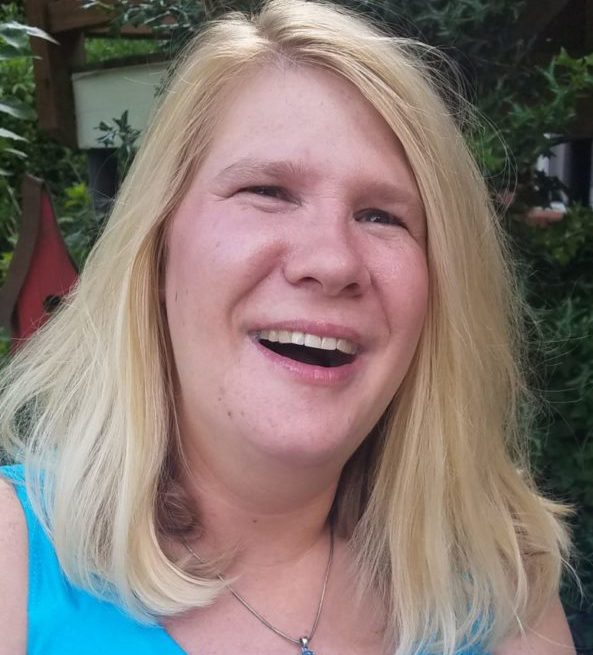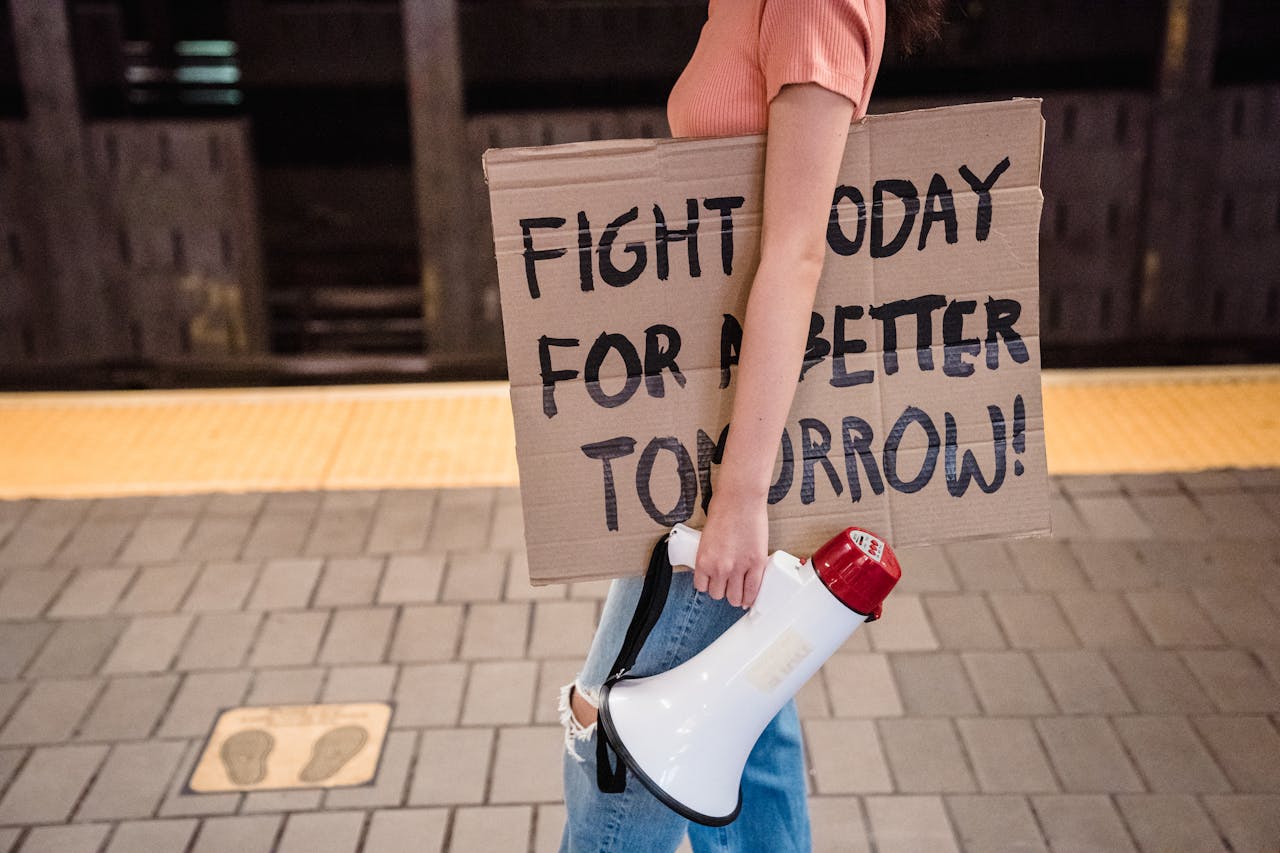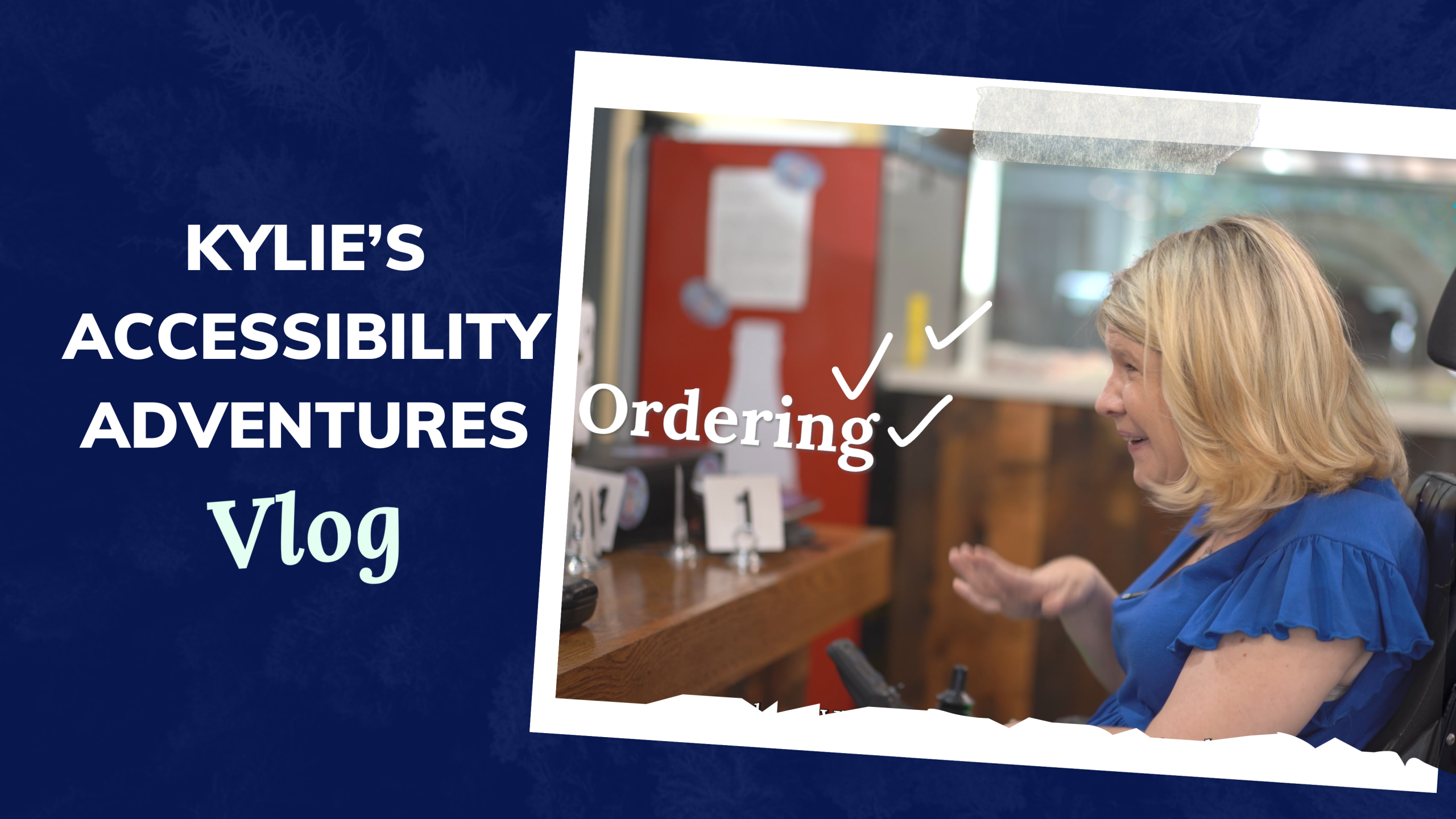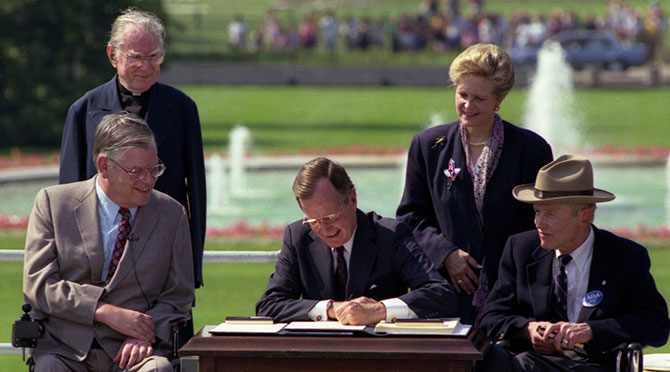Established more than 50 years ago, the Supplemental Security Income (SSI) program aimed to provide a safety net for individuals who are blind, disabled, or elderly. It secures a minimal monthly income for those who qualify. But for some, this is a gift in disguise. To be eligible for payments, individuals cannot have countable assets exceeding $2,000, or $3,000 for couples. If individuals exceed these limits by even one dollar, they risk losing their benefits or putting them in a situation to deal with overpayments. These asset thresholds often force people to sacrifice their independence and put their dreams for self-sufficient lives on hold.
My colleague Agnes Iwaye is an advocate with over five years of experience and a Community Engagement Coordinator at Bobby Dodd Institute (BDI). To represent the community, Agnes is often out and about meeting with legislators weekly as part of her job. Recently, she met with Jillian Cantrell, the legislative correspondent for Senator Bill Russell. During the conversation Agnes spoke about topics like the inequitable workforce and asset thresholds that keep people with disabilities in a poverty cycle. “It was a powerful conversation because legislators serve on various committees that often determine which issues receive attention, playing a key role in shaping the policies that impact our lives. They often have access to funding streams, grants, and programs that can be directed toward our plights and concerns. For example, legislators can help influence what is included in the budget lines,” she says.
Disability advocates can be a valuable resource for their legislators and keep them informed on important issues. Advocates and legislators need to find common ground to build strong relationships. We are responsible for getting to know our legislators and their stances on issues.
If I have learned one thing in my advocacy career, it’s that relationships are essential. This is how I build a strong network while living with a disability. To help you start or continue building relationships with your legislators, I have put together this short manual based on real stories and experiences I’ve had through the years of serving the disability community.
The Importance of Building Relationships with Your Legislators
“The influence of our voices on policymaking cannot be overemphasized. As an advocate for people with disabilities, one of the most fascinating aspects of having a good rapport with legislators is the knowledge that my opinion counts and my voice is heard,” explained Agnes.
Trying to build relationships with your legislators can be intimidating. One important thing to remember is that we are our legislator’s constituents, which means that we are the people who vote our legislators into office. We are among the most important people our legislators will ever interact with. Everyone should learn who their state and US legislators are. It is very easy to find your legislators online. There are many websites where you can type in your zip code and find this information. Once you have found your legislators online, do as much research as possible. Read their bios. Look for things you have in common with them. Find out on what committees your legislators are and what bills they have supported. “It is critical to determine which legislator sits on what committees and who chairs them. Building a good relationship with our legislators and airing our opinions means that our views matter, and “we matter.” These relationships allow us to provide data, stories, and expert insights to shape legislation that supports our initiatives,” added Agnes. You can also find out what events your legislators are scheduled to attend and try to go to these events. Doing research will help you make a stronger connection.
Navigating challenges when building relationships with legislators is not easy. “From my experience, I must admit that not every legislator will immediately understand or support the policies that promote our concerns or adopt our recommendations. I have had the opportunity to speak with a couple of lawmakers, and I must say that not everyone understands our concerns for people with disabilities,” says Agnes. As an example, she mentioned the Raise Wage Act conundrum. While an increase of the minimum wage may seem advantageous, for some people with disabilities it may lead to unemployment. Some may be forced to work fewer hours for fear of earning higher than the income threshold, resulting in the loss of their health benefits.
When a supportive legislator leaves office due to reelections or term limits can also present a challenge. Agnes says that it can feel like starting from scratch. “This is because all the time and efforts invested in educating them about the needs of individuals with disabilities are gone. However, as advocates, we must proactively build relationships with the incoming legislators to bridge the projected gap. By ensuring an ongoing dialogue, we can address concerns and clarify misconceptions, enlighten them during advocacy meetings, and ensure legislators see the broader benefits of investing in opportunities for people with disabilities,” says Agnes.
If you have a plan, you can overcome these challenges. Here is your guide created by disability advocates.
Here Is How to Build Effective Relationships with Your Legislators
Getting in contact with your legislators for the first time can be somewhat nerve-racking, but once you get over the initial fear, it can be a positive experience. For the past 13 years, I have had a great relationship with my state Senator John Albers. I met Senator Albers in 2011. I was taking an advocacy course called Partners in Policymaking. The course challenged the participants to meet with their state legislators in person. I was nervous at first about contacting him. I had just graduated from college and had no experience talking to legislators. I eventually got over my fear and sent an email to his office.
The best way to contact your legislators is by contacting their local or district office or emailing them. When contacting your legislators, you will probably speak with one of their staff members first. A staff member is an integral part of a legislator’s team. They know their legislator’s schedule, platform, and where they stand on specific issues. To build a successful relationship with your legislators, you must also build a rapport with their staff. When you call or send an email, inform them that you are a constituent in their district and that you want to introduce yourself to your Senator or Representative.
There are several ways you can meet with your legislators. You can schedule an in-person meeting at their office or somewhere in their district. You can also schedule a phone or video call with them. An in-person meeting is the most effective way to introduce yourself to your legislators. That way, they can put a face to a name and remember who you are. When I contacted his office, Senator Albers agreed to meet me at a coffee shop in Roswell. Before the meeting, I did a thorough research. I found out his children went to my high school and that he was on the board of EnAble of Georgia, a disability non-profit where I did my college internship. Senator Albers was friendly and engaging during the meeting. I could tell he was listening to what I had to say and truly wanted to improve the lives of people with special needs.
The most impactful way to connect with legislators is by telling your story. Share your life, hobbies, interests, and goals for your future. If you’re working, explain how your job impacts your life. Telling your personal story will help you stand out to your legislators. Whenever I talk or meet with Senator Albers, I update him on things in my life. I tell him about my work at Bobby Dodd Institute and the other advocacy projects in which I’m involved. After sharing your story, explain to your legislators how different issues and pieces of legislation affect you personally. I always inform Senator Albers about legislation and bills affecting the disability community and my life. He always responds to my emails quickly and listens to my concerns. Over the years we have worked together on issues like increasing funding for waivers and supported employment services. We have worked to provide increased wages for employees with disabilities and caregivers who are paid through the Medicaid Waivers. Remember, your story is powerful and can make a difference.
The legislator-constituent relationship is a two-way street, and both parties have equal responsibilities. It is the legislator’s job to listen to their constituent’s concerns and ensure their voices are represented. When I interviewed Senator Albers about the constituent-legislator relationship, he explained, “Our job as public servants is to serve you, and if we don’t have a great relationship like the one you and I have had for so many years now, I wouldn’t be able to represent your needs at the Georgia Capitol best. Any legislator needs to understand and meet with the people who vote for them and whom they serve.”
It is the constituent’s responsibility to inform their legislators about how different issues affect them personally, especially for people in the disability community. Legislators may not be aware of how different bills or legislation affect our situations, so it’s up to us to educate them about these issues. When discussing my role in our relationship, Senator Albers expressed, “You’ve helped educate me so much over the years, and the things we’ve accomplished together have been great because we’ve maintained a strong relationship. Whether through your visits to the Capitol, our phone calls, emails, or other forms of communication, it’s been invaluable.”
Senator Albers said the first step in building a successful relationship is for constituents to meet with their legislators regularly. He described, “When you have regular meetings, you can develop great trust and build a genuine relationship that’s more than just a transactional “I want something” relationship.” Senator Albers explained that the relationship is about “Working together, celebrating successes and building trust and transparency with each other.” He also stated that “constituents can become resources for their legislators by sharing their expertise with them.” I feel fortunate enough to have a Senator who not only cares about my needs but is also a passionate advocate for the disability community as well.
Agnes puts it best: “Advocacy is not done in a vacuum but rather among people; it can only be achieved by building relationships. By speaking up for ourselves and others, we build capacity, influence policies, and hold our legislators accountable. Although building a relationship with legislators can be daunting, especially for beginners, it is our responsibility as constituents to do so, and our legislators owe it to us to listen. By sustaining these relationships, legislators become more aware of the impact of the bills they support on our lives. Our advocacy can draw their attention to what matters to us and has the potential to influence the bills that are enacted.”
Senator Albers: No matter what someone’s special need or gift is, it only benefits everyone else
Kylie Moore: Good afternoon. It’s so good to see you.
Senator John Albers: You too, Kylie.
This blog is all about encouraging people to make powerful and meaningful connections with their legislators. Why do you think it is important for citizens and constituents to make those connections with their elected officials?
You know, Kylie, it’s so important that we maintain a direct relationship so we can understand your needs. Our job as public servants is to serve you, and if we don’t have a great relationship like the one you and I have had for so many years now, I wouldn’t be able to best represent your needs at the Georgia Capitol. It’s really important for any legislator to understand and meet with the people who vote for them and whom they serve. That’s our job. You’ve helped educate me so much over the years, and the things we’ve accomplished together have been great because we’ve maintained a strong relationship. Whether it’s through your visits to the Capitol, our phone calls, emails, or other forms of communication, it’s been invaluable.
It’s a two-way street. I know it’s my responsibility to educate you as your constituent, and it’s your job to listen to me as my senator. It’s definitely a two-way street because we both know what our responsibilities are to each other. How should advocates and constituents make that initial connection?
That’s a great question because making strong connections is sometimes easier for some people than for others. Some people have the flexibility to come meet with us at the Capitol, like you have, or somewhere in our district. I still prefer meeting in person when we can because it helps develop an authentic relationship. But not everyone has that ability. Other ways constituents and advocates can get involved include setting up a call like we’re doing right now or sending an email or information through a website. All of these are important, but I think the most important thing is to create that personal relationship. If you just send a form email that a thousand other people are also sending, it could get lost. It’s different when you know it’s someone you represent and can see or speak to them directly. That’s the most powerful way to make a connection, but any of the methods will work.
How would you suggest constituents overcome that initial fear of talking to a senator or other representatives?
They shouldn’t fear at all because we’re just like they are. We live in the community. We put our pants on one leg at a time. We’re all out here trying to do good things in this world, take care of our families and friends, and pay our bills, so we’re no different from them. We just happened to be put on a ballot and won an election. But we’re all the same people.
What key factors make up a strong constituent-legislator relationship?
The factor that makes up a strong constituent-legislator relationship is regular meetings. Everyone gets busy in this world—you get busy, I get busy, and so do other people. But if you have a regular cadence of communication, develop great trust, and build a genuine relationship that’s more than just a transactional “I want something” relationship, that’s key. It’s about working together, celebrating successes, and building trust and transparency with each other. I think those are the key factors for a great relationship moving forward. And, you know, it’s easy in today’s day and age for people to get upset about something they didn’t like. But I also believe there’s a lot of good happening in the world. We should celebrate the good while working to improve other things at the same time.
And I think it’s also constituents being appreciative of what their legislators are doing for them and not just using them to get what they want because that is not how any good relationship works.
I also think it’s key to finding common ground with legislation. You and I have many things in common. First, we love Roswell. It’s one of the greatest cities in America, and we would do anything to make Roswell better. We love people with disabilities. We believe that they should work and be productive citizens. we also want to support our local businesses., especially in challenging times. Those are three major things we have in common. How can constituents become resources for their legislators?
As legislators, we’re not experts in everything, right? I have a background and certain things I know, but I have to rely on the resources from my constituents because they know their areas of expertise—whether it’s where they work or what they advocate for—better than I do. In the case of the special needs community, I call on a friend, Kylie Moore, who I’m talking to right now because I know she’ll be that resource, just like my friends Heidi Moore, Anna Bullard, and so many others. You know, Charlie Miller and others have unique skills, experience, and knowledge, just as I do when I’m talking to teachers, doctors, or nurses. I need constituents with great information to help educate me so I can best represent them.
You understand that because you’ve been in the disability community for a while. You already had an interest in this community because you were on the board of EnAble of Georgia ( a disability non-profit). You already knew what certain things were, like Medicaid Waivers. I did not have to educate you on everything because you already knew things that relate to the special needs community. Not everyone has that luxury and must educate their legislators a lot more. You have to meet your legislators where they are, and you can’t make assumptions about their knowledge of things.
In your career, how would you say you were able to support the disability community?
You and I have worked together for a long time now, and so many issues have come to mind. I can think of a few rights off the top of my head: we’ve worked to expand waivers for those in need, we’ve worked to help increase wages and access for those supporting people with special needs, and we’ve worked to create more vocational job openings to ensure everyone has the ability to earn money and be a part of their community. In general, I think we’ve brought people together to realize that we’re all one community, one state, working together for the common good. No matter what someone’s special need or gift is, it only benefits everyone else. And I know you’ve heard me say this before, Kylie, but I’m going to say it again: sometimes we use the word “disability,” but I don’t. I believe we’re the ones with disabilities because of how we view the world. If we saw life through the lens of my friend Kylie and other people with special needs, it would be a much, much better place.
I really appreciate that. I think, because we have that relationship, it has worked because we both care about the same things.
I just want to say, Kylie, you are a champion and a personal hero of mine. I love seeing you down at the Capitol—you brighten my entire day. I know you’re doing wonderful things, and I hope you know that. I can’t wait to see you again soon, and I’m always here to help.
Take care.
Now, you have the tools to begin building relationships with your legislators. Take the first step and let me know how it goes. Email me at kylie.moore@bobbydodd.org.

I’m Kylie Moore, from Roswell, Georgia, living with Cerebral Palsy. I’ve dedicated my career to advocating for the disability community, creating self-advocacy programs, and serving on boards. I founded the Ambassador Program at AADD, received the Tom Miller National Advocacy Award in 2020, and now advise Arts InCommunity. When not teaching, I can be found watching the Georgia Bulldogs or my beloved New England Patriots play football or participating in wheelchair sports.




